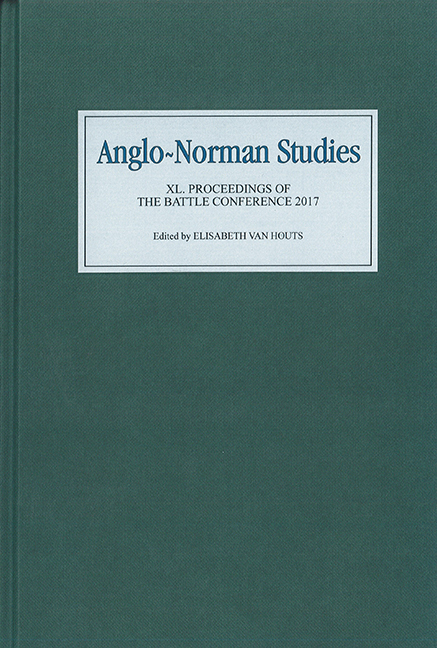Book contents
- Frontmatter
- Contents
- Illustrations and tables
- Editor's preface
- Abbreviations
- The R. Allen Brown Memorial Lecture, 2017
- The R. Allen Brown Memorial Lecture, 2016
- The Marjorie Chibnall Memorial Essay, 2017
- Becket vult: the Appropriation of St Thomas Becket's Image during the Canterbury Dispute, 1184–1200 (The Marjorie Chibnall Memorial Essay)
- La Bataille de Bouvines reconsiderée
- Abbot Peter the Venerable's Two Missions to England (1130 and 1155/1156)
- La production manuscrite anglo-normande et la Bible d'Herman de Valenciennes: usage et réception d'un livre vernaculaire (xii e–xiv e siècles)
- Ralph Niger and the Books of Kings
- From Captivity to Liberation: the Ideology and Practice of Franchise in Crusading France
- Daughter of Fulk, Glory of Brittany’: Countess Ermengarde of Brittany (c.1070–1147)
- The Idea of ‘Empire’ as Hegemonic Power under the Norman and Plantagenet Kings (1066–1204)
- Child Kingship and Notions of (Im)maturity in North-Western Europe, 1050–1262
- Note: A Micro-Economy of Salvation: Further Thoughts on the ‘Annuary’ of Robert of Torigni
The Idea of ‘Empire’ as Hegemonic Power under the Norman and Plantagenet Kings (1066–1204)
from The Marjorie Chibnall Memorial Essay, 2017
Published online by Cambridge University Press: 17 July 2018
- Frontmatter
- Contents
- Illustrations and tables
- Editor's preface
- Abbreviations
- The R. Allen Brown Memorial Lecture, 2017
- The R. Allen Brown Memorial Lecture, 2016
- The Marjorie Chibnall Memorial Essay, 2017
- Becket vult: the Appropriation of St Thomas Becket's Image during the Canterbury Dispute, 1184–1200 (The Marjorie Chibnall Memorial Essay)
- La Bataille de Bouvines reconsiderée
- Abbot Peter the Venerable's Two Missions to England (1130 and 1155/1156)
- La production manuscrite anglo-normande et la Bible d'Herman de Valenciennes: usage et réception d'un livre vernaculaire (xii e–xiv e siècles)
- Ralph Niger and the Books of Kings
- From Captivity to Liberation: the Ideology and Practice of Franchise in Crusading France
- Daughter of Fulk, Glory of Brittany’: Countess Ermengarde of Brittany (c.1070–1147)
- The Idea of ‘Empire’ as Hegemonic Power under the Norman and Plantagenet Kings (1066–1204)
- Child Kingship and Notions of (Im)maturity in North-Western Europe, 1050–1262
- Note: A Micro-Economy of Salvation: Further Thoughts on the ‘Annuary’ of Robert of Torigni
Summary
In 1066, when William duke of Normandy conquered England, he became the head of a political unit, described by some historians as an ‘empire’. Since John Le Patourel in the 1970s, John Gillingham in the 1980s, Martin Aurell in the 2000s, and most recently David Bates, arguments have been given to explain why this set of territories gathered under one ruler could be correctly described with the concept of empire, as used by historians of other periods. In this historiographical trend, the term empire must be seen as a means to look at the social and political dynamics at a global level, without being blinded by the national-colonial or the Romano- Germanic definitions of empire, as if they were the only legitimate or monopolistic languages of empire. For some, these unhelpfully dominant definitions of empire preclude the use of the term to describe the complex realities of the eleventh and twelfth centuries. For them, anachronism denies the term any heuristic strength in analysing the past. Medievalists who have argued against the use of ‘empire’ to describe what the Normans and Plantagenets controlled have also claimed that the kings in question did not use the word imperium to describe their own possessions, or assume an imperial title, because they did not understand their power as being imperial. Accordingly, this ‘anti-imperial’ approach has avoided systematically examining the imperial characteristics of Norman and Plantagenet power; rather, it has either underestimated or consciously ignored markers of empire. For many years, however, new insights into the imperial ideologies of medieval kings, and also into the question of imagined communities, have begun to overturn these misconceptions. Recently for instance, Hugh Thomas showed that despite the fact that the Angevin empire had no name, it was an effective mental construct in the framing of Ralph of Diceto's chronicles. For Thomas, though, this mental construct failed to link the political communities of the empire, which remained, for the time it survived, mainly a family matter.
Another obstacle lies in historians’ anachronistic desire to impose limited definitions on a medieval concept of empire that conveyed, and still conveys, many meanings that had evolved with varying political and ideological contexts over centuries.
- Type
- Chapter
- Information
- Anglo-Norman Studies XLProceedings of the battle conference 2017, pp. 179 - 196Publisher: Boydell & BrewerPrint publication year: 2018
- 1
- Cited by



